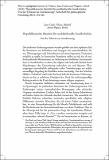Por favor, use este identificador para citar o enlazar a este item:
http://hdl.handle.net/10261/102379COMPARTIR / EXPORTAR:
 SHARE SHARE
 CORE
BASE CORE
BASE
|
|
| Visualizar otros formatos: MARC | Dublin Core | RDF | ORE | MODS | METS | DIDL | DATACITE | |

| Título: | Republikanische Identität für multikulturelle Gesellschaften. Von der Toleranz zur Anerkennung |
Autor: | Velasco Arroyo, Juan Carlos CSIC ORCID ; Wagner, Astrid CSIC ORCID | Palabras clave: | Republikanismus Kollektive Identität Toleranz Kulturelle Vielfalt Konstitutionalismus |
Fecha de publicación: | 23-sep-2014 | Editor: | Vittorio Klostermann | Citación: | Zeitschrift für philosophische Forschung 68 (3): 354-380 (2014) | Resumen: | [EN] This article deals with the possibility to find an identity-establishing political framework that gives space to cultural diversity and exceeds in a normative as well as institutional respect the model of passive tolerance defended by the procedural liberalism. Leaving behind the antithesis of liberalism and nationalism, we show some aporias that come along with the practical realization of the two models of political communities. They concern the limits of constitutionalism (1) and of the concept of tolerance (2). Then we examine if a republican mod-el could satisfy the requirements of the complex modern societies to be acceptable and provide identification potential for all members (3). The identification of the individuals with the whole complex of institutions, legal system and political practice could serve as a base for a new form of "patriotism", if and only if they permit political participation and the coexistence of different cultural traditions. On such a basis, the formation of an open and inclusive collective identity is conceivable, an identity appropriate for multicultural and plurinational societies. [DE] Ziel dieses Artikels ist es, die Möglichkeit eines identitätsstiftenden politischen Rahmens zu erwägen, der Freiraum lässt für kulturelle Unterschiede und sowohl normativ als auch institutionell über das Modell der passiven Toleranz des prozeduralen Liberalismus hinausgeht. Die Antithese von Liberalismus und Nationalismus zurücklassend werden einige Aporien aufgezeigt, die bei der praktischen Umsetzung der beiden Modelle politischer Gemeinschaften zutage treten. Sie betreffen die Grenzen des Konstitutionalismus (1) und des Toleranz-Konzepts (2). Anschließend wird untersucht, ob ein republikanisches Modell für die komplexen modernen Gesellschaften einen Rahmen darstellen könnte, der für alle Mitglieder akzeptabel ist und Identifikationspotential bietet (3). Die Identifikation der Individuen mit dem Gesamt der Institu-tionen, des Rechtssystems und der politischen Praxis könnte, sofern diese politische Partizipation und den Bestand unterschiedlicher kultureller Traditionen erlauben, als Grundlage für eine neue Form von „Patriotismus“ dienen. Auf dessen Basis wäre die Ausbildung einer offenen und inklusiven kollektiven Identität möglich, wie sie für multikulturelle und plurinationale Gesellschaften geeignet erscheint. |
Versión del editor: | http://dx.doi.org/10.3196/004433014813493760 | URI: | http://hdl.handle.net/10261/102379 | DOI: | 10.3196/004433014813493760 | ISSN: | 0044-3301 |
| Aparece en las colecciones: | (CCHS-IFS) Artículos |
Ficheros en este ítem:
| Fichero | Descripción | Tamaño | Formato | |
|---|---|---|---|---|
| Republikanische_Identität.pdf | 551,74 kB | Adobe PDF |  Visualizar/Abrir |
CORE Recommender
SCOPUSTM
Citations
1
checked on 08-abr-2024
Page view(s)
745
checked on 23-abr-2024
Download(s)
273
checked on 23-abr-2024
Google ScholarTM
Check
Altmetric
Altmetric
NOTA: Los ítems de Digital.CSIC están protegidos por copyright, con todos los derechos reservados, a menos que se indique lo contrario.
